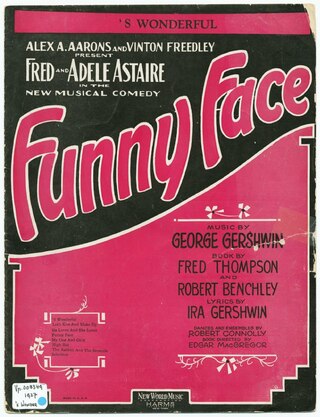
"Night and Day" is a popular song by Cole Porter that was written for the 1932 musical Gay Divorce. It is perhaps Porter's most popular contribution to the Great American Songbook and has been recorded by dozens of musicians. NPR says "within three months of the show's opening, more than 30 artists had recorded the song."

"One for My Baby (and One More for the Road)" is a song written by Harold Arlen and Johnny Mercer for the movie musical The Sky's the Limit (1943) and first performed in the film by Fred Astaire.

"Let's Do It, Let's Fall in Love" is a popular song written in 1928 by Cole Porter. It was introduced in Porter's first Broadway success, the musical Paris (1928) by French chanteuse Irène Bordoni, for whom Porter had written the musical as a starring vehicle.
"You Do Something to Me" is a song written by Cole Porter. It is notable in that it was the first number in Porter's first fully integrated-book musical Fifty Million Frenchmen (1929). In the original production, the song was performed by Genevieve Tobin and William Gaxton, performing the roles of Looloo Carroll and Peter Forbes, respectively.
"They Can't Take That Away from Me" is a 1937 popular song with music by George Gershwin and lyrics by Ira Gershwin. It was introduced by Fred Astaire in the 1937 film Shall We Dance and gained huge success.
"Too Marvelous for Words" is a popular song written in 1937. Johnny Mercer wrote the lyrics for music composed by Richard Whiting. It was introduced by Wini Shaw and Ross Alexander in the 1937 Warner Brothers film Ready, Willing, and Able, as well as used for a production number in a musical revue on Broadway. The song has become a pop and jazz standard and has been recorded by many artists.

"A Fine Romance" is a popular song composed by Jerome Kern with lyrics by Dorothy Fields, published in 1936.
"But Not for Me" is a popular song originally written by George Gershwin and Ira Gershwin for the musical Girl Crazy (1930).
"Don't Fence Me In" is a popular American song written in 1934, with music by Cole Porter and lyrics by Robert Fletcher and Cole Porter. Members of the Western Writers of America chose it as one of the Top 100 Western songs of all time.
"The More I See You" is a popular song composed by Harry Warren, with lyrics by Mack Gordon. The song was first published in 1945.
"(Love Is) The Tender Trap" is a popular song composed by Jimmy Van Heusen, with lyrics by Sammy Cahn.

"'S Wonderful" is a 1927 popular song composed by George Gershwin, with lyrics written by Ira Gershwin. It was introduced in the Broadway musical Funny Face (1927) by Adele Astaire and Allen Kearns.
"I've Got a Crush on You" is a song composed by George Gershwin, with lyrics by Ira Gershwin. It is unique among Gershwin compositions in that it was used for two different Broadway productions: Treasure Girl (1928), when it was introduced by Clifton Webb and Mary Hay, and Strike Up the Band (1930), when it was sung by Doris Carson and Gordon Smith. It was later included in the tribute musical Nice Work If You Can Get It (2012), in which it was sung by Jennifer Laura Thompson. When covered by Frank Sinatra he was a part of Columbia Records.
"Witchcraft" is a popular song from 1957 composed by Cy Coleman with lyrics by Carolyn Leigh.
"Strike Up the Band" is a 1927 song composed by George Gershwin, with lyrics by Ira Gershwin with the collaboration of Millie Raush. It was written for the 1927 musical Strike Up the Band, where it formed part of a satire on war and militaristic music. Although the musical was not successful, the instrumental version of the song, titled the "March from Strike Up the Band", has become quite well known. The song was also used in the Judy Garland-Mickey Rooney 1940 film Strike Up the Band.
"I'm Putting All My Eggs in One Basket" is a popular song written by Irving Berlin for the 1936 film Follow the Fleet, where it was introduced by Fred Astaire and Ginger Rogers. Astaire had a huge hit with the song in 1936 and other popular versions that year were by Jan Garber and by Guy Lombardo.
"Isn't This a Lovely Day?" is a popular song written by Irving Berlin for the 1935 film Top Hat, where it was introduced by Fred Astaire in the scene where his and Ginger Rogers' characters are caught in a gazebo during a rainstorm. The lyric is an example of a song which turns a bad situation into a love song, a common style for Irving Berlin, as in "I've Got My Love to Keep Me Warm" and "Let's Have Another Cup of Coffee".
"Reaching for the Moon" is a popular song written by Irving Berlin for the 1930 musical film of the same name.
"My Shining Hour" is a song composed by Harold Arlen with lyrics by Johnny Mercer for the film The Sky's the Limit (1943). In the film, the song is sung by Fred Astaire and Sally Sweetland, who dubbed it for actress Joan Leslie. The orchestra was led by Freddie Slack. "My Shining Hour" was nominated for an Academy Award for Best Song but lost to "You'll Never Know".
"It's All Right with Me" is a popular song written by Cole Porter, for his 1953 musical Can-Can, where it was introduced by Peter Cookson as the character Judge Aristide Forestier.
This page is based on this
Wikipedia article Text is available under the
CC BY-SA 4.0 license; additional terms may apply.
Images, videos and audio are available under their respective licenses.




